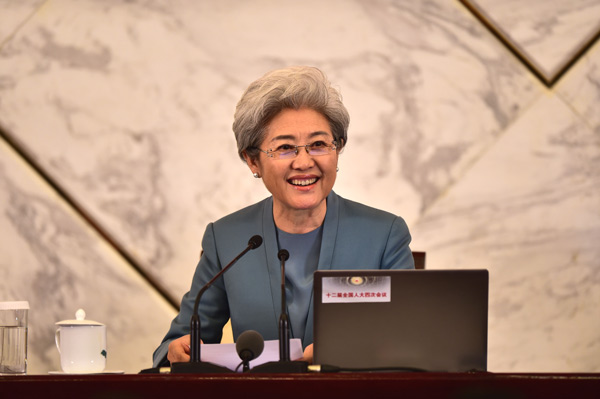NPC spokeswoman: Washington sends warships to region as it accuses Beijing of militarization
 |
|
Fu Ying, spokesperson for the fourth session of China's 12th National People's Congress (NPC), answers questions during a press conference on the session at the Great Hall of the People in Beijing, capital of China, March 4, 2016. The fourth session of the 12th NPC is scheduled to open in Beijing on March 5. [Photo/Xinhua] |
The hype aims to label the Chinese as "threatening regional peace" in the South China Sea and is "misleading", Fu said at a news conference before the opening on Saturday of the fourth session of the 12th NPC.
"If one takes a closer look, isn't it fact that the advanced aircraft and warships traveling back and forth to the South China Sea are from the United States," Fu said. "And a central part of Washington's pivot to Asia strategy is to deploy 60 percent of the US Navy in the Asia-Pacific region."
According to media reports, the US Navy has dispatched the USS John C. Stennis, a nuclear-powered aircraft carrier, to the South China Sea in the past few days. On Wednesday, Admiral Harry Harris, head of the US Pacific Command, confirmed that the US, India and Japan will hold joint naval exercises in waters off the northern Philippines near the South China Sea this year.
Foreign Ministry spokesman Hong Lei said China always respects and stands up for the freedom of navigation in the South China Sea, but firmly opposes any country using that "as an excuse to undermine other countries' interests and security".
That the US continues to send warships so close to the Nansha Islands to flex its military muscle is horribly offensive to the Chinese people, Fu said, and the land reclamation in the Nanshas has improved Beijing's ability to safeguard its interests, provide public services and maintain regional peace and stability.
"We never recognized other countries' illegal occupation of islands and reefs in the Nansha Islands," Fu said, but proposed to "shelve disputes for the sake of joint development". That is not giving up our sovereignty over these islands, but a bid to maintain regional peace and stability, she added.
Zhang Junshe, a senior researcher at the PLA Naval Military Studies Research Institute, said the US patrols in the South China Sea are in fact a way to protect its maritime hegemony by using its powerful navy to challenge China's maritime interests.